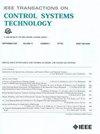电池储能系统的数据驱动控制器整定:一种集隶属度方法
IF 3.9
2区 计算机科学
Q1 AUTOMATION & CONTROL SYSTEMS
引用次数: 0
摘要
工业过程中的资源优化需要精确的控制策略,但往往依赖于难以开发的复杂数学模型,这对传统的控制方法提出了挑战。为了解决这一问题,提出了一种基于集隶属度数据驱动(SMDD)方法的控制器微调方法。这种新技术可以通过利用现实世界的数据来改变工业中用于调整控制器的传统方法,并在控制器设计中提出一种变革性的替代方案。为了证明所提出方法的有效性,将其应用于连接到主电网的峰值容量为267 kW的实际电池储能系统(BESS)的控制器设计过程中。该研究对基于简单开环阶跃响应特性的传统整定技术、现有的BESS试错控制器和SMDD方法进行了详细的对比分析。数据驱动的方法显示出系统性能的显著改善,阶跃响应时间减少了18%,超调量低于1%,证明了其在处理时变通信延迟和固定控制器结构方面的鲁棒性。该研究的结论是,SMDD方法作为一种具有在现实系统中调优控制器潜力的工具而出现。本文章由计算机程序翻译,如有差异,请以英文原文为准。
Data-Driven Controller Tuning for Battery Energy Storage Systems: A Set-Membership Approach
Optimizing resources in industrial processes requires precise control strategies but often relies on complex mathematical models that are difficult to develop, posing challenges for traditional control methods. To solve this problem, an innovative methodology for fine-tuning controllers is presented based on the set-membership data-driven (SMDD) approach. This novel technique can change the traditional methods used for tuning controllers in the industry by leveraging real-world data and presents a transformative alternative in controller design. To demonstrate the effectiveness of the proposed methodology, it is applied in a controller design process for a real battery energy storage system (BESS) with a peak capacity of 267 kW, which is connected to the main grid. The study conducts a detailed comparative analysis between conventional tuning techniques based on simple open-loop step response characteristics, an existing controller for the BESS tuned by trial and error, and the SMDD methodology. The data-driven approach shows significant improvements in the system performance with reductions of up to 18% in step response time and overshoots under 1%, proving its robustness at dealing with time-variant communication delays and fixed controller structures. The study concludes that the SMDD methodology emerges as a tool with the potential for tuning controllers in real-world systems.
求助全文
通过发布文献求助,成功后即可免费获取论文全文。
去求助
来源期刊

IEEE Transactions on Control Systems Technology
工程技术-工程:电子与电气
CiteScore
10.70
自引率
2.10%
发文量
218
审稿时长
6.7 months
期刊介绍:
The IEEE Transactions on Control Systems Technology publishes high quality technical papers on technological advances in control engineering. The word technology is from the Greek technologia. The modern meaning is a scientific method to achieve a practical purpose. Control Systems Technology includes all aspects of control engineering needed to implement practical control systems, from analysis and design, through simulation and hardware. A primary purpose of the IEEE Transactions on Control Systems Technology is to have an archival publication which will bridge the gap between theory and practice. Papers are published in the IEEE Transactions on Control System Technology which disclose significant new knowledge, exploratory developments, or practical applications in all aspects of technology needed to implement control systems, from analysis and design through simulation, and hardware.
 求助内容:
求助内容: 应助结果提醒方式:
应助结果提醒方式:


